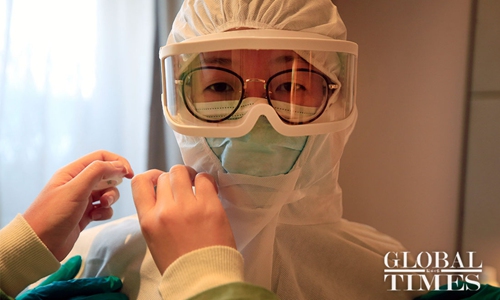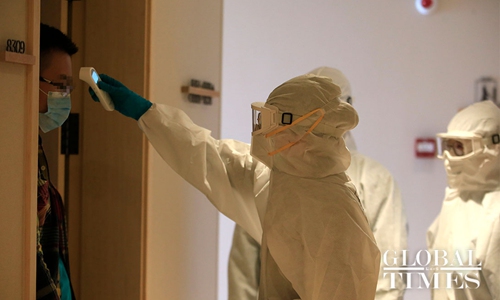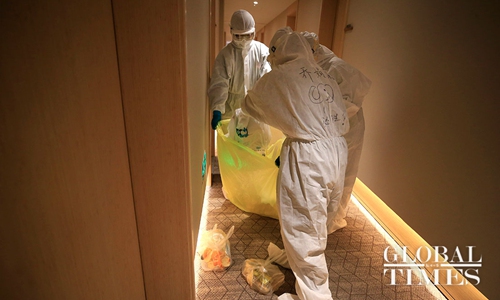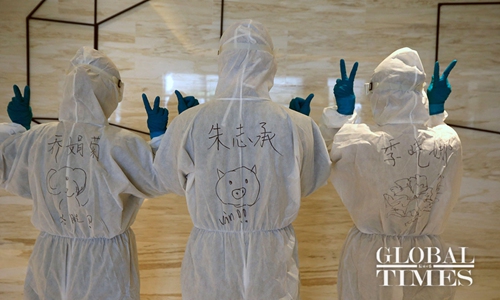Medical staff serve at Shanghai’s centralized quarantine sites to assure those in quarantine

In a centralized quarantine site near Shanghai Hongqiao International Airport, medical personnel deployed by Shanghai Changning District Health Commission, have been working round the clock, despite risks of infection, for half a month, assisting quarantined inbound travelers and helping to identify possible COVID-19 carriers. Photo: Yang Hui/GT
The global spread of the COVID-19 pandemic in the past few days has posed risks to Shanghai's prevention and control of the novel coronavirus as more and more Chinese nationals choose to return home.
Shanghai has set up several centralized quarantine sites across the city to put possible COVID-19 carriers including returnees from countries severely affected by pandemic under quarantine. In Changning district alone, four hotels have been requisitioned as quarantine sites, including two opened lately due to the growing pressure to prevent more imported cases.
The two hotels near Shanghai Hongqiao International Airport have quarantined accumulated 1,110 people as of Thursday morning since January 31, among whom eight were transferred to designated hospitals and were confirmed of COVID-19.
At the quarantine sites, volunteering elite medical staff from the nearby first- and second-tier hospitals in Changning district work in risk of exposure to the virus, but serving, taking care of and assessing the health of the people in quarantine.

In a centralized quarantine site near Shanghai Hongqiao International Airport, medical personnel deployed by Shanghai Changning District Health Commission, have been working round the clock, despite risks of infection, for half a month, assisting quarantined inbound travelers and helping to identify possible COVID-19 carriers. Photo: Yang Hui/GT
Room service from medical staffThe moment they receive the personnel sent from the nearby airport, doctors turn into disinfection workers, porters, hotel servants and psychological consultants, serving and assuring the quarantined have a smooth transition during 14-day period.
Ji Xiaona, one of the seven doctors who work in the "polluted area" of the quarantine site, told the Global Times on Wednesday that their busy work day starts at 6 am, with one doctor checking the personnel list and making phone calls to those who will leave the site that day, and another delivering breakfast to almost 200 people.
As the pandemic worsened abroad, the number of quarantined inbound travelers entering and leaving the site is increasing. "More than 100 people entered or left the site yesterday, 59 entered and 43 left. Since their flight arrived in or departed from Shanghai at different times, it is quite common for us to work round the clock," said Ji, who noted that two weeks ago, on the first day she started working there, she and three of her colleagues received over 90 inbound travelers.

In a centralized quarantine site near Shanghai Hongqiao International Airport, medical personnel deployed by Shanghai Changning District Health Commission, have been working round the clock, despite risks of infection, for half a month, assisting quarantined inbound travelers and helping to identify possible COVID-19 carriers. Photo: Yang Hui/GT
At the moment, the site mainly accepts four categories of personnel including those who are identified as close contacts of confirmed COVID-19 patients, inbound travelers from specific countries who are ineligible for home-quarantine, transit passengers from specific countries and people who have been tested for COVID-19 and are waiting for results.
Since the quarantined people can be carriers of COVID-19, doctors at the site have to work in protective clothes, goggles, masks and gloves when they serve the people meals, water and daily necessities, collect garbage, and take their temperatures.
"Since the hotel's only elevator is in the clean area, we have to use the staircases when we serve the people, and climbing up the staircases in such protective dress and N95 mask is a struggle, like the hypoxia of altitude sickness," said Doctor Qiao Juanju.
The doctor's busiest hours usually start in the afternoon when inbound travelers typically arrive at the quarantine site.
As Shanghai's temperature gets warmer, health workers are feeling the heat. "Even though we do not wear much inside the protective garments, we are sweating all over in such weather. Yesterday, we worked from 3 pm all through 11 pm in the protective clothes," said Doctor Zhu Zhicheng.

In a centralized quarantine site near Shanghai Hongqiao International Airport, medical personnel deployed by Shanghai Changning District Health Commission, have been working round the clock, despite risks of infection, for half a month, assisting quarantined inbound travelers and helping to identify possible COVID19 carriers. Photo: Yang Hui/GT
Safe in Shanghai
South Korean student Lee Won-jin has been under quarantine at a site since last Wednesday when he returned to Shanghai for his study. He told the Global Times that he has been living a very comfortable life at the quarantine site even though he felt scared upon arrival.
"They treat me warm-heartedly and considerately," said the 18-year-old young man, who noted that the only thing that he has not been accustomed to is the Chinese cuisine. "But since I can order take-out foods, it turns out to be no big deal."
As far as Lee knows, there is no such centralized quarantine site with strict management in South Korea. "So my relatives were a bit worried before I returned Shanghai as they knew in advance that I had to go through the quarantine upon arrival," said Lee.
But now he is more worried about his relatives and friends in South Korea instead, because of the loose management in his country where there is no such centralized quarantine site as in Shanghai. "I feel safe and sound staying in Shanghai, much safer than in South Korea," Lee said.